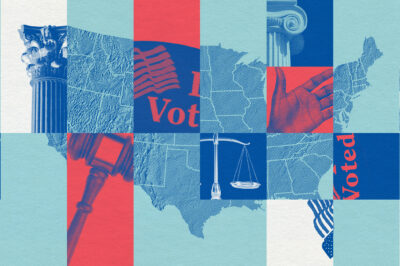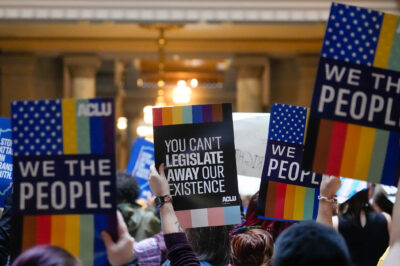
Which city’s police department has taken it upon itself to determine who does and does not belong on the property of commercial businesses?
A Tulsa police officer was suspended for refusing to protect and serve which religious minority?
What Guantánamo prisoner just released memoirs of his experience of rendition, torture and imprisonment without charge or trial?
Popular (yet unfounded) belief holds that which generation does not care about privacy?
How many states have workplace non-discrimination laws that are fully inclusive of LGBT people?
NEW LAWSUIT: Police Should Stop Arresting Innocent People Just for Being on a Business’s Property
The next time you’re in Grand Rapids, Michigan and need to pull into a gas station to make a phone call, check your email, or take a look at your road map, you had better think twice. For years, the Grand Rapids Police Department has taken it upon themselves to determine who does and does not belong on the property of commercial businesses across the city – in many cases questioning, searching, and arresting innocent people for criminal trespass without warning and without the business owner’s knowledge. Sound like a clear violation of the Bill of Rights? It is.
Protecting and Serving All, Regardless of Faith
The American Civil Liberties Union and the ACLU of Oklahoma filed a friend-of-the-court brief this week with the U.S. Court of Appeals for the Tenth Circuit, arguing that a police officer does not have a religious right to refuse assignments simply because they require him to serve people who do not share his faith. In 2011, Tulsa police officer Paul Field was directed to attend, or send officers from his division to attend the event. Fields refused, claiming that to attend or to send officers to a Law Enforcement Appreciation Day event held by the Islamic Society of Tulsa would violate his religious beliefs, which require him to proselytize anyone who does not share his Christian faith. Former police chief Edward L. Smith explains how Fields’ actions violate the Constitution.
Guantánamo Prisoner’s Memoirs Offer Rare First-Person Account of Torture
A detailed and harrowing first-person narrative of a prisoner’s experiences in Guantánamo is available to the public for the first time: on Tuesday, Slate published a three-part series of excerpts from The Guantánamo Memoirs of Mohamedou Ould Slahi. The excerpts were culled from a manuscript hundreds of pages in length, which Slahi provided his attorneys, a pro bono team of ACLU and other lawyers. After being classified for years, Slahi’s memoirs – of arrest, rendition, torture, and imprisonment without charge or trial – are finally seeing the light of day, albeit with some redactions.
Do Young People Care About Privacy?
Everywhere I go, I hear some variation of the claim that “young people today just don’t care about privacy.” This is something that people widely seem to believe is “just true.” The latest claim to this effect comes in the form of a new poll, the release of which was trumpeted with unfortunate headlines like “Millennials don’t worry about online privacy.”
Why ENDA’s Religious Exemption Must Be Narrowed
Remarkably, there are only 16 states that currently have workplace non-discrimination laws that are fully inclusive of LGBT people. This leaves LGBT people vulnerable to workplace discrimination in well over half of the country–an unacceptable situation that must be changed.
To address this, last week, the Employment Non-Discrimination Act (ENDA) was reintroduced in Congress. The legislation would prohibit employment discrimination based on sexual orientation and gender identity in most American workplaces, a critically important step towards full equality for LGBT people.
Learn more about your civil liberties: Sign up for breaking news alerts, follow us on Twitter, and like us on Facebook.



